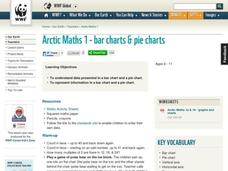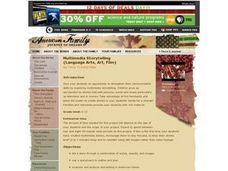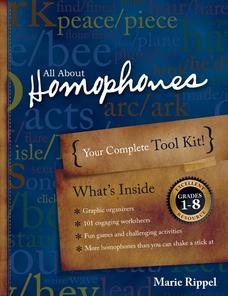Curated OER
Dot Plots
Number crunching statisticians explore displaying data with dot plots and define the difference between quantitative data and qualitative data. Dot plots are created based on a set of given data and analyzed.
Curated OER
Discovering Walt Whitman’s Timeless Poetry
Explore the work of the great American poet Walt Whitman in your classroom.
World Wildlife Fund
Bar Charts & Pie Charts
Learn about life in the Arctic while practicing how to graph and interpret data with this interdisciplinary lesson. Starting with a whole group data-gathering exercise, students are then given a worksheet on which they analyze and create...
Curated OER
Harmony Day - Driven Out
Children explore what life might be like for refugees and people migrating to a different country. Each student lists the five most precious items he/she owns and is then given an extreme scenario to consider. By the end of the exercise,...
Crafting Freedom
F.E.W. Harper: Uplifted from the Shadows
What is stereotyping, and how do we handle stereotyping in our daily interactions? Your young historians will not only have the opportunity to learn about the first African American woman to publish a short story–Frances Ellen...
Texas Heart Institute
Nutrition: How Do I Choose the Right Foods?
Young learners discuss how to practice healthy eating habits and the body's need for energy through discussion and exploration of the MyPlate system.
BBC
Tudors: Life and Society
Here is an interesting lesson that lets kids explore what life was like during the Tudor period. The lesson is written two different ways, one for computer use and one without. It is also written with special instructions for children...
Time Warp Trio
See You Later, Gladiator!
Young historians take a look at the age of gladiators, and the cultural atmosphere present when they staged their epic battles. Pupils pretend to be reporters and write newspaper articles about one of the events they stage. Then,...
Curated OER
Multimedia Storytelling
Experiment with multimedia storytelling. After watching a segment of American Family, first, middle and high schoolers tell a story about their families, clarifying the setting, characters, and script. They work on setting...
Curated OER
Cross-Cultural Dialogue Lesson
Use the Peace Corps to explore a different place and different perspectives. Your class reads the personal narrative "Cross-Cultural Dialogue" by Roz Wollmering, completing an attached story frame sheet in preparation for a class...
Curated OER
Unit Two: The French Revolution and Napoleon
Have your class define, examine, and explore the causes and effects of the French Revolution. The presentation is organized so that students will be able to take effective notes on each topic covered. Critical thinking is promoted...
World of Teaching
Of Mice and Men by John Steinbeck
Explore the life and writing of John Steinbeck. A 48-slide presentation introduces the famous American author, his California heritage, and his impressive collection of published work. Viewers are then introduced to Of Mice and Men, one...
National Endowment for the Humanities
Vengeful Verbs in Shakespeare’s “Hamlet”
It's time for pupils to read, examine, and contemplate literature to explore the difference between vivid and generic verbs. Pupils distinguish between the two types of verbs as they read the ghost scene from Shakespeare's Hamlet. They...
World Wildlife Fund
Arctic Food Chain
Explore the food chains that support Arctic ecosystems. A class discussion on interdependence and the different roles plants and animals play in ecosystems provides students with the knowledge to complete a worksheet asking them to...
North Carolina State University
Shapes
Expose youngsters to 3-D objects in a hands-on learning activity involving marshmallows and toothpicks. Engage your young mathematicians by introducing them to 3-D shapes by means of a story book. Explore 3-D shapes by manipulating...
Baylor College
Do Plants Need Light?
Turn your classroom into a greenhouse with a instructional activity on plant growth. First, investigate the different parts of seeds, identifying the seed coat, cotyledon, and embryo. Then plant the seeds and watch them grow!...
Baylor College
They're Everywhere: Bacteria
Totally gross out your class with the eighth lesson in this series on food science. Explore the microscopic world of bacteria by taking swabs of different classroom objects and growing colonies in petri dishes. An engaging activity that...
Baylor College
What's That Food?
Get things cooking with the first lesson in this series on the science of food. Working in small groups, young scientists make and record observations about different mystery foods. These descriptions are then shared with the class and...
Baylor College
What is Air? Pre-Assessment
First, estimate existing knowledge about air with a class discussion. Then, hand out a 10-question pre-assessment quiz to record how much pupils know to compare to their knowledge later. This will also give mini meteorologists the...
Curated OER
All About Homophones
Put the fun back in reading fundamentals with an interactive set of lessons about homophones. Learners of all ages explore the relationships between words that sound the same but have different meanings, and complete a...
Nuffield Foundation
Assessing Human Hearing
Young scientists explore hearing through multiple experiments, demonstrations, and activities. They focus on the changes in hearing over a lifetime, how we can determine where a sound is coming from, and the ability to filter noises.
Learning Games Lab
The pH Scale and Meter Calibration
What are the different ways to test for pH? First, scholars explore the pH scale and a common way to test for acidity and alkalinity. Then, they learn about the importance of pH in food safety and why variance in pH could potentially...
Curated OER
Blasphemy! Salman Rushdie and Freedom of Expression
Students explore the concepts of blasphemy, censorship and freedom of expression through the lens of Salman Rushdie. They also consider how these issues have been reflected in US history.
Curated OER
Celebrate With Silhouettes
Learners explore history of silhouettes, and help create keepsake silhouettes, frame them, or use them to make a special Mother's Day card.

























